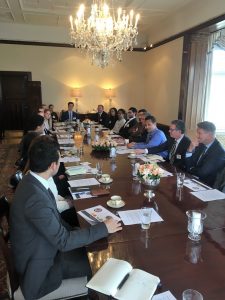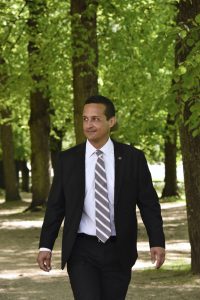NEWS
AmCham News tags
- Accounting / Financial
- AmCham Norway
- Company Profiles
- Education / Research
- Entertainment
- Food & Beverage
- Government
- Healthcare
- Hotel/ Restaurants/ Conferences
- Insurance
- International Leadership Interview Series
- Membership Guide
- Publications
- Rising Leaders
- Technology
- Trade
- Travel
Business News tags
- Accounting / Financial
- Airline / Travel
- Automobile / Transport
- Chemicals / Metals
- Communications/PR/Media
- Culture / Lifestyle
- Defense / Security
- Education / Research
- Energy
- Entertainment & Lifestyle
- Financial / Investment
- Food & Beverage
- Government
- Health
- Human Resources
- Insurance
- IP & Innovation
- Legal
- Management Consulting
- Manufacturing
- Pharmaceutical
- Politics
- Property / Real Estate
- Seafood
- Shipping & Offshore
- Statistics
- Tax
- Technology
- Trade
International Leadership Interview: Jason Turflinger, AmCham Norway
Category: AmCham News
“I collaborate with all kinds of people with all kinds of strengths and try to sponge it all up. It is almost embarrassing, but I have never had a mentor. At least not someone defined as my mentor, but tens of people have been my mentor without really knowing it.”

Jason Turflinger addressing the attendees at AmCham’s annual Thanksgiving Charity Dinner (Photo: Nancy Bundt)
Originally only planning to live abroad for a few years, little did Jason Turflinger know — back in 1998 — that he, twenty years later, would have a station wagon and a family in suburban Oslo and be heading up the American Chamber of Commerce in Norway, having transformed the organization and quadrupled its size since taking the helm.
Where did you start? International experiences? Brief description of your path to where you are now.
I am from Fort Wayne, Indiana and moved to Tampa, Florida to attend the University of South Florida. There, I happened to have a Norwegian roommate. I went to visit him on my way to move to work for a bank in Moscow – I always thought that I would like to live abroad for a year or two. And here I am, still in Norway, 20 years later.
Having previously worked for Bank of America, in 1999, I got the working papers in Norway and started with a consultancy firm. They did innovative management consultancy while also functioning as an incubator. There were 12 companies in the incubator and the expectation was for four or five of these companies to survive or prosper. Interestingly, my role there also included being the search expert of the office. You see, I was familiar with this amazing tool called Google and knew how to use it properly.
Having worked there for a few years. I subsequently started my own firm. I was then engaged to start at AmCham for a 50% management-for-hire position. I realized quickly, however, that it was more than a 50% job, but I also saw a lot of potential and quite frankly, it was a lot of fun! I’ve always said that if there was no such thing as money, I would still do most of my job for free – and that still holds true after more than 15 years.
Having said that, AmCham has changed significantly since then. In 2003, we had 63 members and we are now close to 250. We have essentially quadrupled in size, both in terms of members and employees. The scope of what we do has changed, too. Our three focus areas are events, members services and advocacy. Previously, we did some member services, but not nearly what we have the capacity to offer our members now. We have always done events, but also the scope of our events has changed. We are currently able to offer more specific, themed roundtables and forums, which enables us to cater to a wide array of our members divided across 22 industries.
What are the important decisions you make as a leader of your organization and how do they impact its global presence? Share any recent examples?
We are one of 117 AmChams around the world. I like to think that our take on issues impacts at least the Nordic and the European groups, of which there are 42. We can draw upon the US Chamber in Washington DC as well, who are working with all 117 AmChams around the world.

Jason Turflinger meeting Chicago Mayor and previous Cheif of Staff to Barack Obama, Rahm Emanuel as AmChams in Europe visited Washington DC in 2018.
Looking at AmCham Norway-specific decisions; long-term planning and long-term relationship building is some of the most important work I do.
Interestingly, most of the significant decisions that I make are not just what we agree to do on behalf of members and transatlantic interests, equally imperative is what we say no to. For every initiative or issue we take on, we are declining 6-7 suggestions. Not because they are not good initiatives, but we must maximize our resources and choose the issues where we can have the most impact.
How do you build team morale and maintain the creativity of a diverse team within an international organization?
One of the reasons we come in to the office is to energize each other and for information to flow freely. It is key that communication is open in the office and that ideas are exchanged openly.
In such a manner, I am more of a facilitator than a director. It is my job to facilitate so that the employees can perform. The worst thing I can imagine, is if someone sits on information that could be useful for other people in the organization.
Additionally, I think that creativity and new ideas come when you have a diverse team. Particularly in Norway, the hiring process is one of the most important aspects of a leader’s responsibilities. About 15 years ago, I attended a seminar where a speaker said that “one should hire people that are exactly the same as you, because business is hard enough.” That is probably the exact opposite of what I am trying to do. I look at the totality of the team to see what is missing and try to find that person that improves and compliments the team. I learn something every day from the team and I want to work with people who speak openly and freely. Subsequently, that builds trust among colleagues, our Board and whomever else we collaborate with.
Through AmCham initiatives, such as our forums, we carefully build trust and connect the correct people to ensure good exchange and information flow.
Would you use the same leadership style in a different organization? In a different country? How important is it to tailor your leadership style to your team and environment?
Yes, I would. Everyone likes to talk about how flat the Norwegian structure is in the work place. At the same time, I don’t think it is as rigid in the US as many imply, either.
In the US, like Norway, most companies are small and medium-sized. It is important to remember that most American companies are not the size of Google and ExxonMobil.
However, out of sheer necessity, when you have a company like Lockheed Martin with hundreds of thousands of employees, it must be structured differently than a 10-person shop.
In terms of tailoring my leadership, I have most certainly matured as a leader over the years. I am more hands-off than I used to be. The realization that if the approach used for a project or assignment does not correspond with my idea of how it should be, it does not necessarily mean that it is wrong – it is just a different approach and I appreciate that. I worry less about whether it is done my way or another way, but more about the result for our mission as AmCham and promoting transatlantic business interests.
Quite frankly, I cannot be involved with everything. I would just be a bottleneck for progress and that is the worst thing I can imagine being as a leader.
Where do new ideas and exciting proposals come from in your organization? Has your international experience helped you ‘think outside the box’ in your organization?
From our members and colleagues. I talk to member companies and colleagues daily and they might come up with an idea. Next thing you know, one idea triggers another and suddenly the mold for an initiative starts taking shape. I am lucky, as we have a very engaged and proactive group of member company representatives that we get to work with on a regular basis. That is one of the most enjoyable aspects of this job; there are so many talented people working with different member companies and within different industries – and they all have good ideas.

Jason Turflinger addressing the Rising Leaders participants at the kick-off event of the program, co-launched with the US Embassy.
Admittedly, sometimes people must push and tug on me. I – like everyone – can be set in my ways sometimes. But I appreciate when people don’t take “no” for an answer.
Perhaps my international background has an impact there, as well. The ability to look at certain Norway-specific themes from an outside and macro perspective is useful in my job. Looking at long-term development for Norway – and how Norwegians perceive themselves related to international competition – is one example where the outside-view is useful. Sometimes it appears as though domestic decision-makers do not realize that Norway is indeed competing with neighboring countries for foreign investments.
Just consider the rise of attention and funding for start-ups and entrepreneurial activities in Norway. It is great, but neighboring countries have been doing this for a long time – with varying levels of success and lessons to be learned. Being able to see that big picture from a different perspective is important.
How do you ensure that your team and your company’s services are aligned to your company’s core vision?
Through constant dialogue with member companies. Like any non-profit organization, we have our bylaws. But it is through active communication with our member company leaders that we stay updated on relevant issues, as well as matters of importance for the Norway-US relationship. We do not pretend to be at the center of all these issues, but we provide input and assistance where we can be helpful.
In terms of member dialogue, we do sit down to have formal strategy sessions. More informal conversations are, however, the norm. It is all about the level of trust we have with member companies and there is no easy way or shortcut to building a strong foundation of trust. It takes years to establish and can be lost in a matter of minutes. Hence, the importance of being respectful of our relationships with member companies and the relationships they have with each other is key.
What do you believe are shared traits among leaders? Any common mistakes? What is unique about being a leader in Norway compared to leading an organization in another country?
I believe that a shared trait among good leaders is the ability to be open to feedback and to directly engage employees. The members we work with are knowledge-based. For me, being able to draw upon that knowledge and be inspired by them is beneficial. Everyone needs inspiration. Networks such as ours are an ideal way to meet other leaders from various industries and draw inspiration from their developments, ideas or achievements.

Welcoming attendees at AmCham’s 2016 Election Night event at now OsloMet University (photo: Nancy Bundt)
Generally, in Norway, the open-door policy is very important. The flip side – where we have seen expat leaders not do well – is the top down approach. When new expat leaders arrive and start implementing strategy without explanation or room for interpretation, employees lose the “why.” Those tend not to be long expat leader engagements.
Leaders – and expat leaders in particular – are in their roles to make changes. Particularly important is how they make change decisions and how open they are about them. If they immediately start complaining about working hours and employee engagement, those are challenges they need to adapt to and address, rather than simply being annoyed about.
How do you continue growing and developing as a leader?
I am inspired by the leaders that I work with. If I see a strong public speaker, or an excellent strategic thinker, I try to learn from them. I collaborate with all kinds of people with all kinds of strengths and I try to sponge it all up. It is almost embarrassing, but I have never had a mentor. At least not someone defined as my mentor, but tens of people have been my mentor without really knowing it.
Whatever makes you uncomfortable in your job as part of your professional duties needs to be addressed. If long-term strategic work is painful and you keep putting it off, you need to suck it up and lean on those who can help you address it. It is easy to get set in your ways and you can only progress if you force yourself to improve in the aspects of your job that you are least comfortable with.
What are some of your/company’s recent projects and developments that you are excited to share?
The CFO forum is very exciting. We have been planning it for quite a while. There is no other recurring forum or meeting place for CFOs with internationally-oriented companies to meet – at least without being sold to. Generally, I think that is comforting with our forums. There is no hidden agenda. If there is one, it is to have an open and honest dialogue and dare to discuss failures, not only successes.
A while ago, I attended an event. It was a good and very professional discussion, but not any examples from the participants mentioning any mistakes or anything that had gone wrong. That is the big difference; for these forums to function ideally, it is about creating an environment of trust.
That can be a challenge, as new people are invited to each quarterly session. Consequently, it is essential to keep a core group of participants so that level of trust is maintained.
Moreover, we have always been a very busy shop, but we have not always been good at telling our members and partners about all that we are doing and why. We are now openly sharing our various initiatives and getting that information out. That enables our stakeholders to be more proactive on behalf of Norway-US business interests. Generally, people are now more aware of what our priority issues are – and that is important.
You get the podium at Stortinget for 5 minutes, what topic(s) do you address and why?
Norway’s competitiveness. Yes, we are friends and allies with our neighbors, but at the end of the day, in terms of where companies decide to invest and grow their business, I want Norway to be competitive. Make no mistake, Norway is competing with Sweden, Denmark and Finland to attract foreign investment.
It has come automatically for Norway for the past 40 years, as the energy sector has attracted enormous foreign interests, but now, we are approaching a new juncture.
Yes, a lot of money is being allocated to fund various industrial segments and homegrown startups, which is great. At the same time, we should not forget – and there should be more work – to retain and attract interest from foreign investors. Both through public-private partnerships and direct collaboration. Larger companies need legitimate business motives to partner with smaller companies. Such partnerships are only a good thing.
I remember a quote I heard a while back from an established company leader: “just because I don’t hang out at a coffee shop doesn’t mean I am not innovative.”
Look at industries like healthcare, technology, and food & beverage; for them, it does not necessarily matter where in the world they are centralized. We can do more to attract — and be a hub for — some of these industries. If not in the world, at least in Northern Europe.
If you could give your 20-year old self some advice, what would that be?
Don’t work as much! At that time, I was going to university full-time and working full-time. Eating Taco Bell in my car on my way from school to work in the afternoons, five to six days a week. It was rewarding, because I was earning more money than most students, but I should have dedicated more time to being a student, and worried about my career later. I will give that same advice to my kids, who are quickly approaching that age.
What do you see in the next generation of leaders aspiring to run an international organization? Advice to them?
Be patient and do a good job where you are. If you do well, it will get noticed and you will get your chances. People say a lot about millennials and their natural digital awareness, whereas we had to learn all of that in our adult lives. Leaders today need to respect that and be comfortable with the fact that they will never be as digitally advanced as subsequent generations. At the same time, the coming generation needs to respect experience and know-how gained from decades of professional experience.
As I tell my teenage son, you do not know what you do not know yet, and that is ok. Be aware of that, however, and be interested in learning new skills and adapting new knowledge. Your career will span decades, and you will learn.
What is the latest time you responded to an email last night?
I wrote an email last night, or, had written most of it during the day, but needed to check something. I then hit “send” at about nine in the evening.
Source: AmCham

